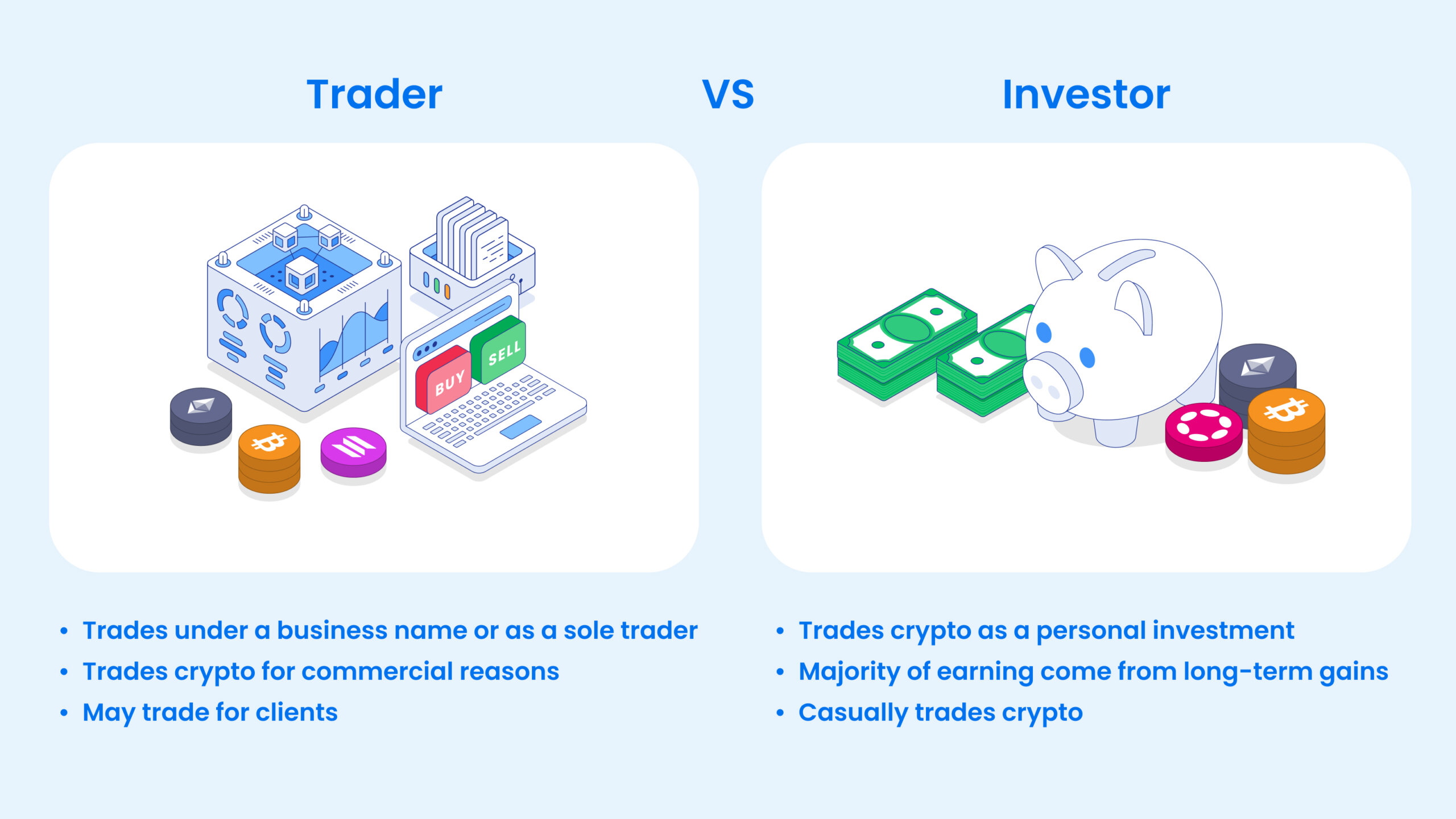
In Australia, a Company, Trust, or Self-Managed Super Funds can be used to invest in cryptocurrency, which can provide a more flexible management structure and tax benefits. However, they have additional reporting requirements, which makes accurate crypto reconciliation even more essential.
The crypto tax reporting requirements of Companies, Trusts and SMSFs are broadly similar in Australia, but there is an important distinction that these entities need to make. This course is for educational purposes only and should not be considered tax or financial advice. You should seek out the help of an accountant to obtain advice.
Trading stock or investment?
A question that all crypto users need to ask themselves is: “Am I in business?”. For legal entities in Australia, the outcome of this question determines whether to apply trading stock or investment rules.

It is important to note that Self-Managed Super Funds are not able to conduct a business, which excludes them from certain activities.
Generally speaking, companies and trusts are in business when they conduct continuous or repeated activities with the purpose of making profit. If a company or trust purchases cryptocurrency as a long term investment, it may be the case that they are deemed not to be in business. In some circumstances, Companies and Trusts can conduct both investment and business activities simultaneously.
The ATO is yet to provide a robust definition of cryptocurrency activities that constitute being in business, which leaves activities such as liquidity provision, decentralised lending and staking as a gray area. For this reason, SMSFs should be especially conservative with their investment activity choices, to not be deemed “in business” by the ATO.
If an entity is deemed to be in business, trading stock rules then apply.
Reporting Requirements
Companies, Trusts and SMSFs are required to submit a full account of their cryptocurrency activity in each financial year.
The reports required may differ based on the status of the entity as a business or investment:
- Complete Activity Report: This report summarises all transactions completed by the entity in a specific financial year. This includes fiat deposits, trades, deposits and withdrawals, and smart contract interactions.
- Holdings Valuation Report: This report contains a list of all assets currently held by the entity, including their nominal balance and market value at end-of-financial-year.
- Gross Profit Report: This report summarises the outcomes of activities for the financial year, and includes values such as profit or loss from trades, staking rewards, and DeFi activities.
- Capital Gains Tax Report: This report summarises the gains and losses that result from trading activities for entities classified as investors.
- Income Report: This report contains the amount and fiat value of income earned by crypto activities for entities classified as investors, such as staking rewards or interest payments.
Heuristics For Report Accuracy
Legal entities are held to a high standard of accuracy, and are required to comprehensively account for all transactions. To understand how to measure report accuracy, it is important to define the two ways asset balances can be recorded:
- Reported balance: This is the balance read directly from cryptocurrency exchanges, wallets and blockchains and acts as a third-party source of truth for the account.
- Calculated balance: This is the balance calculated by a crypto tax tool or accountant, based on the transactional data provided.
To ensure that a set of reports are accurate, the calculated balance needs to match the reported balance. This shows that:
- All data has been collected correctly and is complete.
- Buys, sells, deposits and withdrawals have been reconciled correctly.
However, this does not indicate that the correct treatment has been applied to specific transaction types, so a case by case investigation of transactions can be required.
Seek Support
The complexities of crypto tax are as extensive as cryptocurrency itself, which encourages many crypto users to seek professional support. Cryptocate, a crypto tax service company, ensures entities accurately report their crypto investment activity.
Similar to traditional bookkeeping, Cryptocate reviews client data, to then perform a comprehensive reconciliation of both on-chain and centralised transactions. Once reconciliation is complete, reports are generated and delivered to the client for submission by their accountant.
Summary
Legal entities such as companies, trusts and SMSFs can give investors and businesses various benefits, which makes them attractive to conduct cryptocurrency-related trading or investment. These benefits need to be balanced against the additional taxation responsibilities. Professional help is advised, since cryptocurrency tax is complex and can require professional judgement.

Claim 30% off new CTC plans using code SWYFTX30.
Crypto Tax Calculator is an Australian-made crypto tax solution designed to handle everything from exchange trading to complex on-chain activity.
Claim offer now
Quiz
Disclaimer: The information on Swyftx Learn is for general educational purposes only and should not be taken as investment advice, personal recommendation, or an offer of, or solicitation to, buy or sell any assets. It has been prepared without regard to any particular investment objectives or financial situation and does not purport to cover any legal or regulatory requirements. Customers are encouraged to do their own independent research and seek professional advice. Swyftx makes no representation and assumes no liability as to the accuracy or completeness of the content. Any references to past performance are not, and should not be taken as a reliable indicator of future results. Make sure you understand the risks involved in trading before committing any capital. Never risk more than you are prepared to lose. Consider our Terms of Use and Risk Disclosure Statement for more details.

 Course rewarded
Course rewarded
 Article read
Article read




